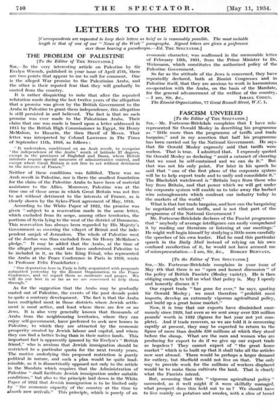LETTERS TO THE EDITOR
[Correspondents are requested to keep their letters as brief as is reasonably possible. The most suitable length is that of one of our " News of the Week" paragraphs. Signed letters are given a preference over those bearing a pseudonym.—Ed. THE SPECTATOR.]
THE PROBLEM OF PALESTINE
[To the Editor of TILE SPECTATOR.] SIR,—In the very interesting article on Palestine by Sir Evelyn Wrench, published in your issue of April 27th, there are two points that appear to me to call for comment. One is the alleged War promise to the Palestinian Arabs, and the other is their reputed fear that they will gradually be ousted from the country.
It is rather disquieting to note that after the repeated refutation made during the last twelve years of the allegation that a promise was given by the British Government to the Arabs in Palestine to grant them independence, this allegation is still persisted in and believed. The fact is that no such promise was ever made to the Palestinian Arabs. Their claim that one was made is based upon a letter addressed in 1915 by the British High Commissioner in Egypt, Sir Henry McMahon, to Hussein, the then Sherif of Mecca. That letter was interpreted by Colonel Lawrence in The Times of September 11th, 1919, as follows : " It undertakes, conditional on an Arab revolt, to recognize
the independence of the Arabs ' south of latitude 37 degrees, except in the provinces of Baghdad and Basra, where British interests require special measures of administrative control, and except where Great Britain is not free to act without detriment to the interests of France."
Neither of these conditions was fulfilled. There was no Arab revolt in Palestine, nor is there the smallest foundation for the claim of the Palestine Arabs to have been of material assistance to the Allies. Moreover, Palestine was at the time one of those areas in which Great Britain was not free to act without detriment to the interests of France, as is clearly shown by the Sykes-Picot agreement of May, 1916.
According to the White Paper of 1922, the promise was given " subject to a reservation made in the same letter, which excluded from its scope, among other territories, the portions of Syria lying to the west of the district of Damascus. This reservation has always been regarded by His Majesty's Government as covering the vilayet of Beirut and the inde- pendent sanjak of Jerusalem. The whole of Palestine west of the Jordan was thus excluded from Sir Henry McMahon's pledge." It may be added that the Arabs, at the time of the alleged promise, could not have understood Palestine to be included in it, as the late King Feisal, who represented the Arabs at the Peace Conference in Paris in 1919, wrote to Professor Felix Frankfurter : " Our deputation here in Paris is fully acquainted with proposals submitted yesterday by the Zionist Organization to the Peace 'Conference, and we regard them as moderate and proper. We will do our best in so far as we are concerned to help them through."
As for the suggestion that the Arabs may be gradually ousted out of Palestine, the events of the past decade point to quite a contrary development. The fact is that the Arabs have multiplied most in those districts where Jewish settle- ment is most active, and least where there are few or no Jews. It is also very generally known that thousands of Arabs from the neighbouring territories, where they can enjoy self-government, have preferred to seek new homes in Palestine, to which they are attracted by the economic prosperity created by Jewish labour and capital, and where they can find a better living than in their native lands. This important fact is apparently ignored by Sir Evelyn's " British friend," who is anxious that Jewish immigration should be restricted to a particular quota for the next twenty years. The motive underlying this proposed restriction is purely political in nature, and such a plan would be quite inad- missible, as it is diametrically opposed not only to the article in the Mandate which requires that the Administration of Palestine " shall facilitate Jewish immigration under suitable conditions," but also to the principle laid down in the White Paper of 1922 that Jewish immigration is to be limited only by the economic capacity of the country at the time to absorb new arrivals." This principle, which is purely of an economic character, was reaffirmed in the memorable letter of February 13th, 1931, from the Prime Minister to Dr. Weizmann, which constitutes the authorized policy of the Palestine Government.
So far as the attitude of the Jews is concerned, they have repeatedly declared, both at Zionist Congresses and in Palestine itself, that they are anxious to work in harmonious co-operation with the Arabs, on the basis of the Mandate, for the general advancement of the welfare of the country,








































 Previous page
Previous page